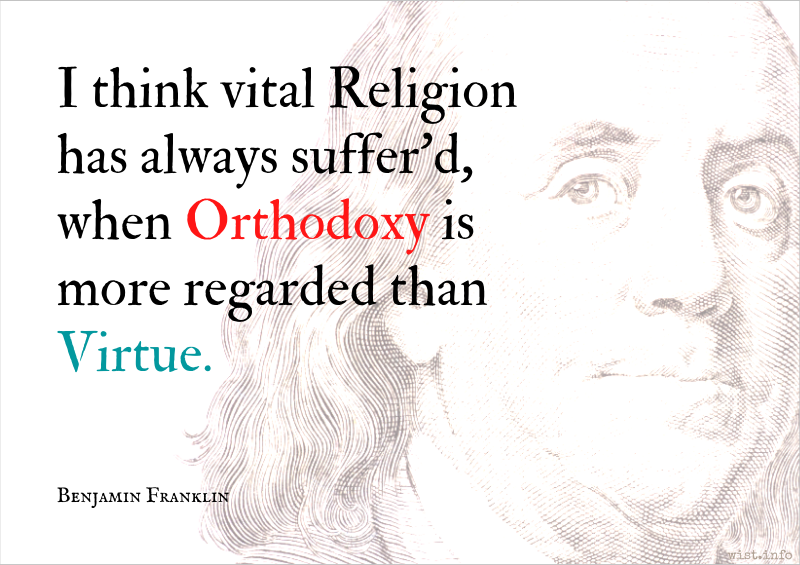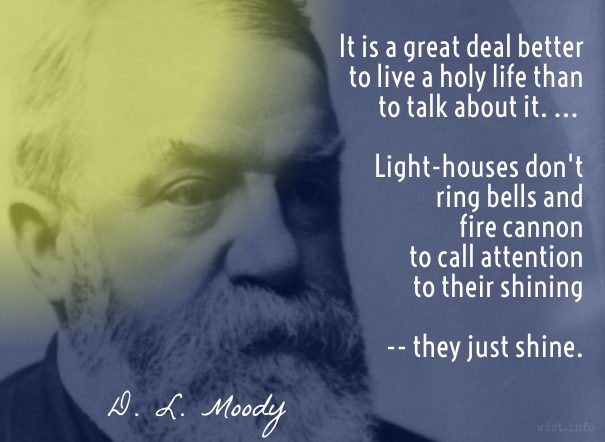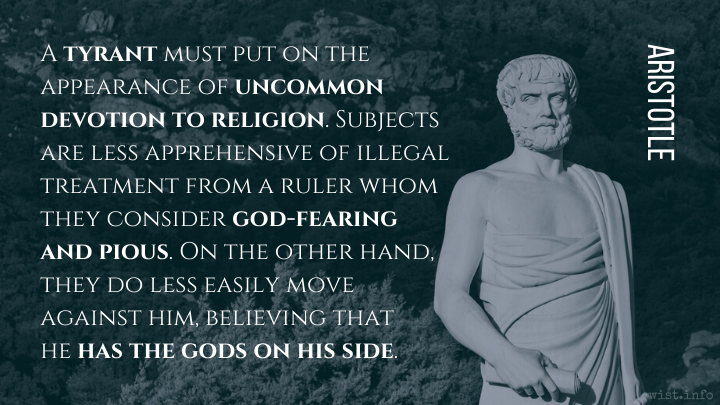Ah, Postumus! they fleet away,
Our years, nor piety one hour
Can win from wrinkles and decay,
And Death’s indomitable power.
[Eheu fugaces, Postume, Postume,
labuntur anni nec pietas moram
rugis et instanti senectae
adferet indomitaeque morti.]Horace (65-8 BC) Roman poet and satirist [Quintus Horacius Flaccus]
Odes [Carmina], Book 2, # 14, l. 1ff (2.14.1-4) (23 BC) [tr. Conington (1872)]
(Source)
"To Postumus." It is unclear which acquaintance of Horace this was addressed to; the name is popularly associated (back to Horace's time) with being given to a child born after the death of their father (which gives it a certain irony here); in reality, it was originally given to the (broader) category of last children of a father.
(Source (Latin)). Alternate translations:
Ah Posthumus! the years of man
Slide on with winged pace, nor can
Vertue reprieve her friend
From wrinkles, age, and end.
[tr. Fanshawe; ed. Brome (1666)]
Time (Posthumus) goes with full sail,
Nor can thy honest heart avail
A furrow'd brow, old age at hand,
Or Death unconquer'd to withstand:
One long night,
Shall hide this light
From all our sight,
And equal Death
Shall few dayes hence,
stop every breath.
[tr. S. W.; ed. Brome (1666)]
The whirling year, Ah Friend! the whirling year Rouls on apace;
And soon shall wrinkles plough thy wither'd Face:
In vain you wast your Pious breath,
No prayers can stay, no vows defer
The swift approach of Age, and conqu'ring Death.
[tr. Creech (1684)]
Alas! my Postumus, my Postumus, the fleeting years glide on; nor will piety cause any delay to wrinkles, and advancing old age, and insuperable death.
[tr. Smart/Buckley (1853)]
Ah, Posthumus, the years, the fleeting years
Still onwards, onwards glide;
Nor mortal virtue may
Time's wrinkling fingers stay,
Nor Age's sure advance, nor Death's all-conquering stride.
[tr. Martin (1864)]
Postumus, Postumus, the years glide by us,
Alas! no piety delays the wrinkles,
Nor old age imminent,
Nor the indomitable hand of Death.
[tr. Bulwer-Lytton (1870)]
Ah! Postumus! Devotion fails
The lapse of gliding years to stay,
With wrinkled age it nought avails
Nor conjures conquering Death away.
[tr. Gladstone (1894)]
Ah me! how quickly, Postumus, Postumus,
Glide by the years! nor even can piety
Delay the wrinkles, and advancing
Age, and attacks of unconquer'd Hades.
[tr. Phelps (1897)]
Alas! Postumus, Postumus, the fleeing years
Slip by, and duteousness does not give pause
To wrinkles, or to hasting age,
Or death unconquerable.
[tr. Garnsey (1907)]
Ah! Postumus, Postumus, fast fly the years,
And prayers to wrinkles and impending age
Bring not delay; nor shalt assuage
Death's stroke with pious tears.
[tr. Marshall (1908)]
Alas, O Postumus, Postumus, the years glide swiftly by, nor will righteousness give pause to wrinkles, to advancing age, or Death invincible.
[tr. Bennett (Loeb) (1912)]
Ah, Postumus, my Postumus, the fleeting years roll by;
Wrinkles and ever nearing eld stay not for piety:
Relentless they, relentless death's unconquered tyranny.
[tr. Mills (1924)]
Ah, how they glide by, Postumus, Postumus,
The years, the swift years! Wrinkles and imminent
Old age and death, whom no one conquers --
Piety cannot delay their onward
March.
[tr. Michie (1963)]
Oh year by year, Póstumay,
Póstumay, time slips by,
And holiness can't stop us drying,
Or hold off death.
[tr. Raffel (1983)]
How the years go by, alas how the years go by.
Behaving well can do nothing at all about it.
Wrinkles will come, old age will come, and death,
Indomitable. Nothing at all will work.
[tr. Ferry (1997)]
Alas! O Postumus, Postumus! Swiftly the years glide by, and no amount of piety will wrinkles delay or halt approaching age or ineluctable death.
[tr. Alexander (1999)]
Oh how the years fly, Postumus, Postumus,
they’re slipping away, virtue brings no respite
from the wrinkles that furrow our brow,
impending old age, Death the invincible.
[tr. Kline (2015)]
Quotations about:
piety
Note not all quotations have been tagged, so Search may find additional quotes on this topic.
And I have known small cities, who revere
The Gods, made subject to unrighteous power,
Vanquish’d by spears more numerous.[πόλεις τε μικρὰς οἶδα τιμώσας θεούς,
αἳ μειζόνων κλύουσι δυσσεβεστέρων
λόγχης ἀριθμῷ πλείονος κρατούμεναι.]Euripides (485?-406? BC) Greek tragic dramatist
Bellerophon [Βελλεροφῶν], frag. 286 (TGF) (c. 430 BC) [tr. Wodhull (1809)]
(Source)
Nauck (TGF) frag. 286, Barnes frag. 8, Musgrave frag. 25. (Source (Greek)). Alternate translations:
I know too of small cities doing honour to the gods which are subject to larger, more impious ones, because they are overcome by a more numerous army.
[tr. Collard, Hargreaves, Cropp (1995)]
I see minor states that honor gods subject to greater ones that revere none, for ‘might is right’.
[tr. Stevens (2012)]
I know small cities honouring the gods that obey larger and more impious ones since they are outnumbered in spearmen.
[tr. Dixon (2014)]
I know that small cities honor the gods,
Cities that obey stronger more impious men
Because they are overpowered by the strength of their arms.
[tr. @sentantiq (2015)]
I know of small cities where the gods are honored: yet these same cities are forced to comply with the demands of impious men in larger cities, overpowered by the sheer magnitude of their armament.
[tr. Emerson]
Surely I wept, leaning upon a ledge
Of the rough rock, so that my escort said,
“Art thou then weak and foolish like the rest?
Here lives true piety when pity dies.
But who more wicked than the man who yields
To sorrow place where judgment is divine!”[Certo io piangea, poggiato a un de’ rocchi
del duro scoglio, sì che la mia scorta
mi disse: “Ancor se’ tu de li altri sciocchi?
Qui vive la pietà quand’è ben morta;
chi è più scellerato che colui
che al giudicio divin passion comporta?]Dante Alighieri (1265-1321) Italian poet
The Divine Comedy [Divina Commedia], Book 1 “Inferno,” Canto 20, l. 25ff (20.25-30) (1309) [tr. Johnston (1867)]
(Source)
Virgil chides Dante for weeping over the fate of the damned in the third circle, fourth bolgia, who themselves are also weeping.
Maybe. There are a lot of scholarly debates over some of the wording and pronoun references here. Some translators play off the word pietà meaning both "pity" and "piety" in Italian. It's also possible that, rather than the final lines condemning Dante for letting his compassion defy an acceptance of God's judgment, they refer to the sinful arrogance of fortune-tellers (the group being punished here) in believing they can question or change God's decrees for the future.
(Source (Italian)). Alternate translations:
Leaning against the rock, I so great grief
Express'd, that thus my Guide to me apply'd;
Are you among the weak to be arrang'd?
When without life, 'tis here Compassion lives.
Who can more wicked be estem'd than He
Who thinks that the divine Decrees are wrong.
[tr. Rogers (1782), l. 22ff]
Their laboring reins the falling tear bedew'd,
Deep struck with sympathetic woe I stood,
'Till thus the Bard my slumb'ring reason woke: --
"Dar'st thou the sentence of thy God arraign;
Or with presumptuous tears his doom profane?
Say, can thy tears his righteous doom revoke?
[tr. Boyd (1802), st. 5]
Against a rock
I leant and wept, so that my guide exclaim’d:
“What, and art thou too witless as the rest?
Here pity most doth show herself alive,
When she is dead. What guilt exceedeth his,
Who with Heaven’s judgment in his passion strives?
[tr. Cary (1814)]
Certes I wept so, leaning toward a breast
Of that hard shelf, mine escort chiding said:
"Why wilt thou yet be foolish as the rest?
Here pity best hath life when wholly dead:
What guiltier wretch than he whose grief avowed
Impugns Almighty Judgment?
[tr. Dayman (1843)]
Certainly I wept, leaning on one of the rocks of the hard cliff, so that my Escort said to me: "Art thou, too, like the other fools?
"Here pity lives when it is altogether dead. Who more impious than he that sorrows at God's judgment?"
[tr. Carlyle (1849)]
Sore I lamented, leaning on a rock,
A rough-planed crag, until my guide addressed
The words -- "Are you, too, foolish like the rest?
Here Pity is alive, e'en when quite dead.
And what can be more wicked than the man
Who 'gainst heaven's justice in his passion ran.
[tr. Bannerman (1850)]
Truly I wept, leaning upon a peak
Of the hard crag, so that my Escort said
To me: "Art thou, too, of the other fools?
Here pity lives when it is wholly dead;
Who is a greater reprobate than he
Who feels compassion at the doom divine?
[tr. Longfellow (1867)]
Of a truth I began to weep leaning against one of the rocks of the hard cliff, so that my Escort said to me: "Art thou yet among the other foolish ones? Here pity lives when it is right dead. Who is more wicked than he who brings passion to the judgement of God?"
[tr. Butler (1885)]
Surely I wept, supported on a rise
Of that fire-hardened rock, so that my guide
Said to me: "Thou too 'mongst the little wise?
Here Pity lives alone, when it hath died.
Who is the greater scelerate than he
Who lets his passion 'gainst God's judgment bide?"
[tr. Minchin (1885)]
Truly I wept, leaning on one of the rocks of the hard crag, so that my Guide said to me, “Art thou also one of the fools? Here pity liveth when it is quite dead. Who is more wicked than he who feels compassion at the Divine Judgment?"
[tr. Norton (1892)]
I wept indeed, leaning against a rock on the stony ridge, so overcome, that my Guide said to me: "Art thou too like the other fools? Here pity liveth but when it is truly dead. Who is more lost to righteousness than he whose pity is awakened at the decree of God?"
[tr. Sullivan (1893)]
Certain, I wept, supported on a comer
Of the hard spur, so freely that my escort
Said to me : "Art thou still among the simple?
Here piety lives when wholly dead is pity.
Who is than he more desperately wicked
Who to the doom divine doth bring compassion?
[tr. Griffith (1908)]
I wept indeed, leaning on one of the rocks of the rugged ridge, so that my Escort said to me: "Art thou too as witless as the rest? Here pity lives when it is quite dead. Who is more guilty than he that makes the divine counsel subject to his will?"
[tr. Sinclair (1939)]
Truly I wept, leant up against the breast
Of the hard granite, so that my Guide said:
"Art thou then still so foolish, like the rest?
Here pity lives when it is rightly dead.
What more impiety can he avow
Whose heart rebelleth at God's judgment dread?
[tr. Binyon (1943)]
Truly I wept, leaned on the pinnacles
Of the hard rock; until my guide said, "Why!
And art thou too like all the other fools?
Here pity, or here piety, must die
If the other lives; who's wickeder than one
That's agonized by God's high equity?"
[tr. Sayers (1949)]
Certainly,
I wept. I leaned agianst the jagged face
of a rock and wept so that my Guide said: "Still?
Still like the other fools? There is no place
for pity here. Who is more arrogant
within his soul, who is more impious
than one who dares to sorrow at God's judgment?
[tr. Ciardi (1954)]
Truly I wept, leaning on one of the rocks of the hard crag, so that my guide said to me, “Are you even yet among the other fools? Here pity lives when it is altogether dead. Who is more impious than he who sorrows at God’s judgment?"
[tr. Singleton (1970)]
Indeed I did weep, as I leaned my body
against a jut of rugged rock. My guide:
"So you are still like all the other fools?
In this place piety lives when pity is dead,
for who could be more wicked than that man
who tries to bend divine will to his own!
[tr. Musa (1971)]
Of course I wept, leaning against a rock
along that rugged ridge, so that my guide
told me: “Are you as foolish as the rest?
Here pity only lives when it is dead:
for who can be more impious than he
who links God's judgment to passivity?
[tr. Mandelbaum (1980)]
I certainly wept, supported on one of the rocks
Of the projecting stone, so that my escort
Said to me: "Are you too like the other fools?
Here pity is alive when it is dead:
Who is more criminal than he who suffers
Because he does not like the divine judgement?
[tr. Sisson (1981)]
Truly I wept,
Leaning on an outcrop of that rocky site,
And my master spoke to me: "Do you suppose
You are above with the other fools even yet?
Here, pity lives when it is dead to these.
Who could be more impious than one who'd dare
To sorrow at the judgment God decrees?"
[tr. Pinsky (1994)]
Surely I wept, leaning on one of the rocks of the hard ridge, so that my guide said to me: “Are you still one of the other fools?
Here pity lives when it is quite dead: who is more wicked than one who brings passion to God’s judgment?"
[tr. Durling (1996)]
Truly, I wept, leaning against one of the rocks of the solid cliff, so that my guide said to me: "Are you like other fools, as well? Pity is alive here, where it is best forgotten. Who is more impious than one who bears compassion for God’s judgement?"
[tr. Kline (2002)]
Of this, be sure: that, leaning on a spur
of that unyielding cliff, I wept. "Are you,"
my escort said, "like them, an idiot still?
Here pity lives where pity's truth is dead.
Who is more impious, more scarred with sin
than one who pleads compassion at God's throne?"
[tr. Kirkpatrick (2006)]
Yes, I wept, leaning against a spur
of the rough crag, so that my escort said:
"Are you still witless as the rest?
Here piety lives when pity is quite dead.
Who is more impious than one who thinks
that God shows passion in His judgment?"
[tr. Hollander/Hollander (2007)]
O yes, I wept, leaning for support on one
Of the solid rocks in the reef, making my guide
Say this: "You're still one of the stupid ones?
Down here, the only living pity is dead.
Is anyone more wicked than the man
Regretting the righteous judgment decreed by God?"
[tr. Raffel (2010)]
I wept indeed, held up in my surprise
By one rock of the ridge. My Escort said:
"You're witless as the rest? Here pity dwells,
But only when it's absolutely dead.
Who is more guilty than he who by spells
And mysteries makes it seem as if divine
Judgment were subject to his will?"
[tr. James (2013)]
But if nature does not ratify law, then all the virtues may lose their sway. For what becomes of generosity, patriotism, or friendship? Where will the desire of benefitting our neighbours, or the gratitude that acknowledges kindness, be able to exist at all? For all these virtues proceed from our natural inclination to love mankind.
[Atqui si natura confirmatura ius non erit, uirtutes omnes tollantur. Vbi enim liberalitas, ubi patriae caritas, ubi pietas, ubi aut bene merendi de altero aut referendae gratiae uoluntas poterit existere? Nam haec nascuntur ex eo quod natura propensi sumus ad diligendos homines, quod fundamentum iuris est.]
Marcus Tullius Cicero (106-43 BC) Roman orator, statesman, philosopher
De Legibus [On the Laws], Book 1, ch. 15 / sec. 43 (1.15/1.43) [Marcus] (c. 51 BC) [tr. Barham/Yonge (1878)]
(Source)
(Source (Latin)). Alternate translations:
If nature does not ratify law, all the virtues lose their sway. What becomes of generosity, patriotism, or friendship? Where should we find the desire of benefitting our neighbours, or the gratitude that acknowledges kindness? For all these virtues proceed from our natural inclination to love and cherish our associates.
[tr. Barham (1842)]
And if Nature is not to be considered the foundation of Justice, that will mean the destruction [of the virtues on which human society depends]. For where then will there be a place for generosity, or love of country, or loyalty, or the inclination to be of service to others, or to show gratitude for favours received? For these virtues originate in our natural inclination to love our fellow-men, and this is the foundation of Justice.
[tr. Keyes (1928)]
That is why every virtue is abolished if nature is not going to support justice. What room will there be for liberality, patriotism, and devotion; or for the wish to serve others or to show gratitude? These virtues are rooted in the fact that we are inclined by nature to have a regard for others; and that is the basis of justice.
[tr. Rudd (1998)]
If nature will not confirm justice, all the virtues will be eliminated. Where will there be a place for liberality, for love of country, for piety, for the desire to do well by others or return kindness? These all arise because we are inclined by nature to love other humans, and that is the foundation of justice.
[tr. Zetzel (1999)]
And if right has not been confirmed by nature, they may be eliminated. In fact, where will liberality be able to exist, where affection for the fatherland, where piety, where the will either to deserve well of another or to or to return a service? These things originate in this, that we are inclined by nature to to cherish human beings; that is the foundation of right.
[tr. Fott (2013)]
A man who parades his piety is one who, under an atheist king, would be an atheist.
[Un dévot est celui qui, sous un roi athée, serait athée.]
Jean de La Bruyère (1645-1696) French essayist, moralist
The Characters [Les Caractères], ch. 13 “Of the Fashion [De la Mode],” § 21 (13.21) (1688)
(Source)
La Bruyère notes in the original this refers to a "faux dévot."
(Source (French)). Alternate translations:
An Hypocrite is one that will be an Atheist under a King that is so.
[Bullord ed. (1696)]
A Devote is one, that under a King who was an Atheist, would be a Devote.
[Curll ed. (1713)]
A Devoto is one, that under an atheistical King wouild be an Atheist.
[Browne ed. (1752)]
A pious person is one who, under an atheistical king, would be an atheist.
[tr. Van Laun (1885)]
A pious hypocrite is one who, under an atheistic king, would be an atheist.
[tr. Stewart (1970)]
The garb of religion is the best cloak for power.
William Hazlitt (1778-1830) English writer
“On the Clerical Character,” Conclusion (7 Feb 1818)
(Source)
True character arises from a deeper well than religion. It is the internalization of moral principles of a society, augmented by those tenets personally chosen by the individual, strong enough to endure through trials of solitude and adversity. The principles are fitted together into what we call integrity, literally the integrated self, wherein personal decisions feel good and true. Character is in turn the enduring source of virtue. It stands by itself and excites admiration in others. It is not obedience to authority, and while it is often consistent with and reinforced by religious belief, it is not piety.
E. O. Wilson (1929-2021) American biologist, naturalist, writer [Edward Osborne Wilson]
Consilience: The Unity of Knowledge, ch. 11 “Ethics and Religion” (1998)
(Source)
Wisdom is by far the greatest part of joy,
and reverence toward the gods must be safeguarded.
The mighty words of the proud are paid in full
with mighty blows of fate, and at long last
those blows will teach us wisdom.[πολλῷ τὸ φρονεῖν εὐδαιμονίας
πρῶτον ὑπάρχει. χρὴ δὲ τά γ᾽ εἰς θεοὺς
μηδὲν ἀσεπτεῖν. μεγάλοι δὲ λόγοι
μεγάλας πληγὰς τῶν ὑπεραύχων
ἀποτίσαντες
γήρᾳ τὸ φρονεῖν ἐδίδαξαν.]Sophocles (496-406 BC) Greek tragic playwright
Antigone, l. 1348ff [Chorus] (441 BC) [tr. Fagles (1982), l. 1466ff]
(Source)
Final lines of the play. Original Greek. Alternate translations:
Wisdom is first of the gifts of good fortune:
'Tis a duty, to be sure, the rites of the Gods
Duly to honor: but words without measure, the
Fruit of vain-glory, in woes without number their
Recompense finding,
Have lesson'd the agéd in wisdom.
[tr. Donaldson (1848)]
Of happiness the chiefest part
Is a wise heart:
And to defraud the gods in aught
With peril's fraught.
Swelling words of high-flown might
Mightily the gods do smite.
Chastisement for errors past
Wisdom brings to age at last.
[tr. Storr (1859)]
Wise conduct hath command of happiness
Before all else, and piety to Heaven
Must be preserved. High boastings of the proud
Bring sorrow to the height to punish pride: --
A lesson men shall learn when they are old.
[tr. Campbell (1873)]
Wisdom is provided as the chief part of happiness, and our dealings with the gods must be in no way unholy. The great words of arrogant men have to make repayment with great blows, and in old age teach wisdom.
[tr. Jebb (1891)]
Wisdom alone is man's true happiness.
We are not to dispute the will of heaven;
For ever are the boastings of the proud
By the just gods repaid, and man at last
Is taught to fear their anger and be wise.
[tr. Werner (1892)]
Wisdom is the supreme part of happiness; and reverence towards the gods must be inviolate. Great words of prideful men are ever punished with great blows, and, in old age, teach the chastened to be wise.
[tr. Jebb (1917)]
There is no happiness where there is no wisdom;
No wisdom but in submission to the gods.
Big words are always punished
And proud men in old age learn to be wise.
[tr. Fitts/Fitzgerald (1939), l. 1039ff]
Of happiness the crown
And chiefest part
Is wisdom, and to hold
The gods in awe.
This is the law
That, seeing the stricken heart
Of pride brought down,
We learn when we are old.
[tr. Watling (1947), Exodos, l. 1027ff]
Our happiness depends
on wisdom all the way.
The gods must have their due.
Great words by men of pride
bring greater blows upon them.
So wisdom comes to the old.
[tr. Wyckoff (1954)]
Of happiness, far the greatest part is wisdom,
and reverence towards the gods.
Proud words of arrogant man, in the end,
Meet punishment, great as his pride was great,
Till at last he is schooled in wisdom.
[tr. Kitto (1962)]
Wisdom is supreme for a blessed life,
And reference for the gods
Must never cease. Great words, sprung from arrogance.
Are punished by great blows.
So it is one learns, in old age, to be wise.
[tr. Woodruff (2001)]
By far is having sense the first part
of happiness. One must not act impiously toward
what pertains to gods. Big words
of boasting men,
paid for by big blows,
teach having sense in old age.
[tr. Tyrell/Bennett (2002)]
The most important thing in man’s happiness is good judgement and he must not treat with disdain the works of the gods.
The arrogant pay for their big proud words with great downfalls and it’s only then, in their old age that they gain wisdom!
[tr. Theodoridis (2004)]
The most important part of true success
is wisdom -- not to act impiously
towards the gods, for boasts of arrogant men
bring on great blows of punishment --
so in old age men can discover wisdom.
[tr. Johnston (2005)]
Knowledge truly is by far the most important part of happiness, but one must neglect nothing that the gods demand. Great words of the over-proud balanced by great falls taught us knowledge in our old age.
[tr. Thomas (2005)]
I think vital Religion has always suffer’d, when Orthodoxy is more regarded than Virtue. And the Scripture assures me, that at the last Day, we shall not be examin’d what we thought, but what we did; and our Recommendation will not be that we said Lord, Lord, but that we did GOOD to our Fellow Creatures.
Benjamin Franklin (1706-1790) American statesman, scientist, philosopher, aphorist
Letter to Josiah and Abiah Franklin (13 Apr 1738)
(Source)
His parents. Franklin cites Matt. 26 in the letter, but it should be Matt. 25:31-46.
I don’t kno as i want tew bet enny money, and giv odds, on the man, who iz alwus anxious tew pray out loud, every chance he kan git.
[I don’t know as I want to bet any money, and give odds, on the man who is always anxious to pray out loud, every chance he can get.]
Josh Billings (1818-1885) American humorist, aphorist [pseud. of Henry Wheeler Shaw]
Everybody’s Friend, Or; Josh Billing’s Encyclopedia and Proverbial Philosophy of Wit and Humor, “Mollassis Kandy” (1874)
(Source)
In self-examination, take no account of yourself by your thoughts and resolutions in the days of religion and solemnity; examine how it is with you in the days of ordinary conversation and in the circumstances of secular employment.
Jeremy Taylor (1613-1667) English cleric and author
(Attributed)
(Source)
Quoted in The Friends' Intelligencer (24 Jun 1882).
[Dr. John] Campbell is a good man, a pious man. I am afraid he has not been in the inside of a church for many years; but he never passes a church without
pulling off his hat. This shews that he has good principles.
The man of business goes on Sunday to the church with the regularity of the village blacksmith, there to renounce and abjure before his God the line of conduct which he intends to pursue with all his might during the following week.
George Bernard Shaw (1856-1950) British playwright and critic
Fabian Essays in Socialism, “The Basis of Socialism: Economic” (1889)
(Source)
It is a great deal better to live a holy life than to talk about it. We are told to let our light shine, and if it does, we won’t need to tell anybody it does. Light-houses don’t ring bells and fire cannon to call attention to their shining — they just shine.
Piety practised in solitude, like the flower that blooms in the desert, may give its fragrance to the winds of heaven, and delight those unbodied spirits that survey the works of God and the actions of men; but it bestows no assistance upon earthly beings, and however free from taints of impurity, yet wants the sacred splendour of beneficence.
Samuel Johnson (1709-1784) English writer, lexicographer, critic
The Adventurer, #126 “Praises of Solitude”
(Source)
It will presumably be thought better, indeed one’s duty, to do away with even what is close to one’s heart in order to preserve the truth, especially when one is a philosopher. For one might love both, but it is nevertheless a sacred duty to prefer the truth to one’s friends.
[ἀληθείας καὶ τὰ οἰκεῖα ἀναιρεῖν, ἄλλως τε καὶ φιλοσόφους ὄντας: ἀμφοῖν γὰρ ὄντοιν φίλοιν ὅσιον προτιμᾶν τὴν ἀλήθειαν.]
Aristotle (384-322 BC) Greek philosopher
Nicomachean Ethics [Ἠθικὰ Νικομάχεια], Book 1, ch. 6 (1.6, 1096a.15) (c. 325 BC) [tr. Crisp (2000)]
(Source)
This is actually not given as a general guideline for living life, but specifically about offering a philosophical argument in opposition that offered by friends. (Source (Greek)). Alternate translations:
Still perhaps it may appear better, nay to be our duty where the safety of the truth is concerned, to upset if need be even our own theories, specially as we are lovers of wisdom: for since both are dear to us, we are bound to prefer the truth.
[tr. Chase (1847), ch. 3]
And yet, where the interests of truth are at actual stake, we ought, perhaps, to sacrifice even that which is our own -- if, at least, we are to lay any claim to a philosophic spirit. Both are dear to us alike, but truth must be religiously preserved.
[tr. Williams (1869)]
Yet it will perhaps seem the best, and indeed the right course, at least when the truth is at stake, to go so far as to sacrifice what is near and dear to us, especially as we are philosophers. For friends and truth are both dear to us, but it is a sacred duty to prefer the truth.
[tr. Welldon (1892)]
In the interests of truth we ought to sacrifice even what is nearest to us, especially as we call ourselves philosophers. Both are dear to us, but it is a sacred duty to give the preference to truth.
[tr. Peters (1893)]
Yet it would perhaps be thought to be better, indeed to be our duty, for the sake of maintaining the truth even to destroy what touches us closely, especially as we are philosophers or lovers of wisdom; for, while both are dear, piety requires us to honour truth above our friends.
[tr. Ross (1908)]
Still perhaps it would appear desirable, and indeed it would seem to be obligatory, especially for a philosopher, to sacrifice even one's closest personal ties in defense of the truth. Both are dear to us, yet 'tis our duty to prefer the truth.
[tr. Rackham (1934)]
Yet it would seem better, perhaps, and something we should do, at any rate when the preservation of the truth is at stake, to confute even what is properly our own, most of all because we are philosophers. For while we love both our friends and the truth, it is a pious thing to accord greater honor to the truth.
[tr. Reeve (1948)]
Yet it would perhaps be thought better, and also our duty, to forsake even what is close to us in order to preserve the truth, especially as we are philosophers; for while both are dear, it is sacred to honor truth above friendship.
[tr. Apostle (1975), ch. 4]
Yet surely it would be thought better, or rather necessary (above all for philosophers), to refute, in defence of truth , even views to which one is attached; since both are dear, it is right to give preference to the truth.
[tr. Thomson/Tredennick (1976)]
Still, it presumably seems better, indeed only right, to destroy even what is close to us if that is the way to preserve truth. And we must especially do this when we are philosophers, lovers of wisdom; for though we love both the truth and our friends, piety requires us to honor the truth first.
[tr. Irwin/Fine (1995)]
But perhaps it might be held to be better, in fact to be obligatory, at least for the sake of preserving the truth, to do away with even one's own things, especially for those who are philosophers. For although both are clear, it is a pious thing to honor the truth first.
[tr. Bartlett/Collins (2011)]
A tyrant must put on the appearance of uncommon devotion to religion. Subjects are less apprehensive of illegal treatment from a ruler whom they consider god-fearing and pious. On the other hand, they do less easily move against him, believing that he has the gods on his side.
Aristotle (384-322 BC) Greek philosopher
Politics [Πολιτικά], Book 5, ch. 11 / 1314b.39
Alt. trans.:
- "Also he should appear to be particularly earnest in the service of the Gods; for if men think that a ruler is religious and has a reverence for the Gods, they are less afraid of suffering injustice at his hands, and they are less disposed to conspire against him, because they believe him to have the very Gods fighting on his side. At the same time his religion must not be thought foolish." [tr. Jowett (1885)]
- "And, moreover, always to seem particularly attentive to the worship of the gods; for from persons of such a character men entertain less fears of suffering anything illegal while they suppose that he who governs them is religious and reverences the gods; and they will be less inclined to raise insinuations against such a one, as being peculiarly under their protection: but this must be so done as to give no occasion for any suspicion of hypocrisy." [tr. Ellis (1912)]
- "And further he must be seen always to be exceptionally zealous as regards religious observances (for people are less afraid of suffering any illegal treatment from men of this sort, if they think that their ruler has religious scruples and pays regard to the gods, and also they plot against him less, thinking that he has even the gods as allies), though he should not display a foolish religiosity." [tr. Rackham (1932)]
- "Further, he must always show himself to be seriously attentive to the things pertaining to the gods. For men are less afraid fo being treated in some respect contrary to the law by such persons, if they consider the ruler a god-fearing sort who takes thought for the gods, and they are less ready to conspire against him as one who has the gods too as allies. In showing himself of this sort, however, he must avoid silliness." [tr. Lord (1984)]























